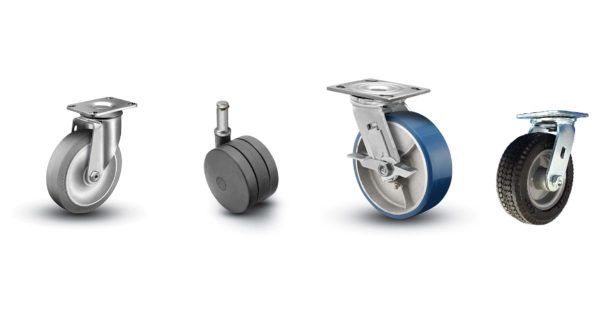
Every home or business needs the ability to move things easily from one area to another. While technology provides many ways to help us move things, the small, but mighty swivel caster delivers outstanding capabilities in almost every environment. This blog will review the different types of casters for most applications you may encounter. We’ll explore how selecting the right casters for the job can speed processes, keep goods safe, and make it easier for you to accomplish a variety of tasks.
Choosing the Right Casters
1. Assess your needs and requirements: This is the first thing you need to do when choosing casters. It might be helpful to write down exactly what you are trying to achieve, and the obstacles you may be facing that can keep you from reaching your goals. Maybe you need furniture casters, specifically furniture leg casters. Or you might have some highly specific retail, medical, commercial, or industrial requirements. In each of these scenarios, three points are important to factor into your decision:
- Deciding if your application requires the use of indoor or outdoor casters.
- Flooring considerations: Will your casters need to travel over concrete, carpet, or uneven surfaces? If you have that type of flooring, you can delve into our selection of casters for hardwood floors too.
- Do temperature, exposure to solvents or chemicals, or moisture exposure enter into the equation?
Next, you will want to focus on some of the maneuverability aspects of your application. These can include your mobility requirements. You may need to get through tight areas or a specific warehouse walkway or outdoor path that has a bumpy or rutted surface.
The weight of the items you’ll be moving is a top consideration. Each item alone may not be very heavy, but if you’re moving 1,000 small items on big pallets or trays, the combined weight will be more substantial. Therefore, you’ll want to choose from different types of casters that offer a good load-bearing capacity.
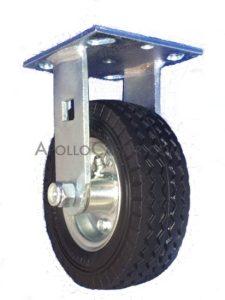
Caster; Rigid; 10″ x 3″; Flat Free Tire
Another key when moving items is control and braking capabilities. Nearly every application requires at least some of the casters to be swivel. The differentiator is whether to put all swivel casters or have two rigid casters. This is determined by weight. A lightweight application can use all swivels and still allow the user to control it. Once you pass a certain amount of weight, having two rigid casters ensures the user does not lose control. Ergonomic casters protect the user by easing the level of strain required to move the application thereby avoiding injury. They offer the ultimate in maneuverability and responsiveness. These casters are important to help minimize pulling and pushing.
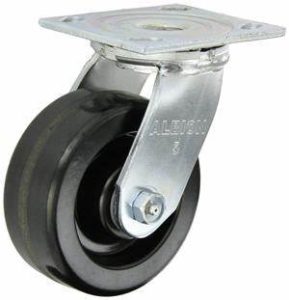
Caster; Swivel; 8″ x 2-1/2″; Phenolic
You’ll also want to investigate the various braking options available. Position lock brakes allow the user to effectively convert swivel casters into rigid casters which provides both the flexibility of movement with all swivels and the control needed for heavier loads needing non-swiveling casters. Basic wheel brakes are available in several styles depending on the user’s preference. Total locking brakes minimize all movement by locking both the wheels and the swivels. On larger casters, the total lock brake pedals can be either trailing or leading as the caster travels.
2. Evaluating quality and durability
When choosing casters, durability and quality are a must to ensure performance. Apollo Caster sells top-of-the-line casters in every category, from commercial to office furniture to industrial casters. Get the functionality you need, the connector type you want, and the finish and color you desire. 
Caster; Ball; Swivel; 2-1/2″, Antique
3. Considering budget constraints
Cost considerations are always included in any product selection. The key to caster choice is to get casters made from the best materials at a price that works for your budget. Choosing casters is actually one of those times you will be well-rewarded by spending a bit more. Quality casters will last longer and ultimately reduce costs. They help protect your goods and equipment and keep people safer (less effort to move goods and less chance of caster performance failure).
Types of Casters for Different Applications
Here we provide highlights of some of the top Apollo Caster products in each of these categories:
Office and furniture casters
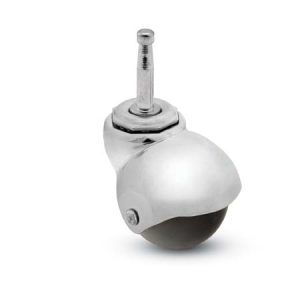
Caster; Spherical; Swivel; 2″ (Item #69100): Hooded Ball casters are popular for store fixtures, furniture, office equipment and medical equipment. They feature double-ball bearing raceways, octagon washers on the threaded stems for easy installation, and the 2″ model is heat treated. The 1-5/8″ ball is a soft, non-marking rubber, while the 2″ models have a tougher, higher weight capacity polyolefin wheel. Several finishes are available.
Industrial casters
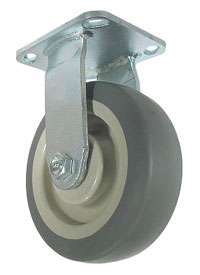
Caster; Rigid; 4×1-1/2; Thermoplasticized Rubber (Gray) (Item #67012): Thermoplastic Rubber (TPR) wheels are precision molded and mechanically locked to a durable polyolefin core to provide an economical wheel for many applications. They provide a smooth, cushioned ride and can overcome small debris and obstacles on the floor. They offer floor protection and are non-marking and non-conductive.
Medical casters
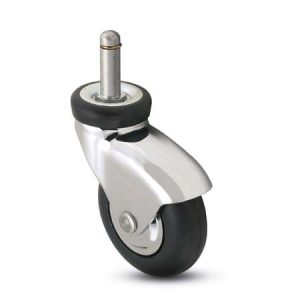
Caster; Swivel; 3″ x 15/16″; Rubber; Soft (Item #69967): For casters indicating Soft rubber wheels, they are a good choice for those applications where the average load is light with occasional loads using the full capacity of the wheel. Soft Rubber wheels are made of quality materials with a resilient rubber tread bonded to the hard rubber core. These wheels are an economical choice for moving equipment.
Heavy duty casters
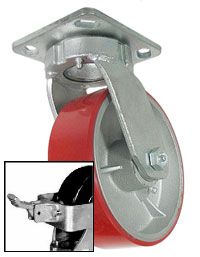
Caster; Swivel; 6″ x 3″; PolyU on Cast (Item #63227): This Polyurethane on Steel wheel is considered extreme duty and offer a longer wearing, higher capacity material that will not damage or mark floors. Polyurethane wheels are durable and are built to withstand permanent flat spots in the tread. This combination of high-load urethane chemically fused to a steel core makes this wheel one of the most long-lasting, rugged wheels available. Excellent for applications where heavy loads and continuous usage cause regular poly wheels to degrade.
Specialized casters (e.g., high-temperature)
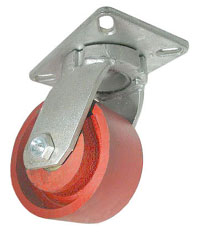
Caster; Swivel; 6″ x 2″; Crown Ductile Steel; Plate (4-1/2″x6-1/4″; holes: 2-7/16″x4-15/16″ slots to 3-3/8″x5-1/4″; 1/2″ bolt); Roller Brng; 2000#; Kingpinless (Item #63974): Built for high capacity applications, the cast iron wheels can withstand extreme heat. These are available in a wide variety of sizes, weight capacities, and bearing types.
Shop all high-temperature casters
Selecting a Caster Wheel
The size, tread, and material you choose should match the use you have in mind. As previously stated, you’ll want to keep your floor or outdoor area’s composition in mind, plus any environmental stresses your caster wheels may be exposed to. You’ll need to consider tread, size of the caster, and material carefully, so you will be able to safely and securely move your goods with the least amount of effort.
Check out types of caster wheels
Common Mistakes to Avoid When Choosing Casters
It’s important to avoid these common mistakes when choosing casters, so you can prevent dangerous mishaps that can injure people and damage items you may be moving on carriers fitted with caster wheels. Keep these points in mind:
- Neglecting load capacity requirements: Factor in the loads you’ll require the casters to handle so they can get the job done safely and effectively. You may especially wish to take this into consideration when selecting industrial casters.
- Ignoring environmental factors: High heat, exposure to chemicals, and other environmental contributors can make unsuitable casters fail fast. Choose swivel casters that are made for the environment you’ll be using them in.
- Opting for the cheapest option without considering long-term costs: Price is always a consideration, and there are two ways to think about that. One is that you can pay as little as possible and try to get a moderate quality caster. What comes with that decision is potential failure at a critical moment, which could cause injury to a person and risk the breakage of the goods or equipment being transported. The other choice is to go with a quality rolling caster that’s well-suited to the job you need it to do (high heat, uneven ground, supporting heavy weight). Then you have the best chance of the caster holding up under stress, reducing the potential for injuries, and providing better protection for the goods you are moving. Top quality casters can also save time by helping you get the job done with smoother operation.
- Failing to properly install or maintain casters: Setting up and maintaining casters helps keep them operating as they should. It’s important to take care of this equipment so it can serve you as you require for a long time.
Apollo Caster Offers Top Quality Casters for Every Application
Choosing the right casters depends on the environment where they’ll be used, the goods you will be moving, the people moving them, and the budget constraints you may be facing. It all comes down to matching your casters to your application. Apollo Caster’s wide range of caster products allows you to choose the exact caster that will perform the way you need it to in your application. Whether choosing replacement casters for office chairs, carpet casters, casters for table legs, or for moving delicate medical equipment, high-quality casters will more than pay for themselves through optimal performance and longevity. Our caster selection is the best combination of quality and price for all your commercial, industrial, medical, home, garage, shop, office, and other applications.
We are always happy to help you select the right casters. Call us at 1.888.344.3036 or contact us online.
Frequently Asked Questions
How do I choose a caster?
Choose a caster based on its weight capacity, your mobility needs, and the setting where it will be used. You may need small casters or heavy duty casters, depending on the job they will perform. Consider commercial or industrial requirements, and decide on the right furniture casters you need for chairs, tables, and more.
Are all casters the same size?
Casters are available in many sizes to accommodate different load capacities and applications, from small rolling casters to heavy duty casters.
What’s the difference between hard and soft casters?
For cushioning and floor protection, soft casters, often featuring rubber, are a good choice. Metal or polyurethane are the materials found in many hard casters. These provide top rolling resistance and outstanding durability.
Do bigger casters roll better?
Overall, this is true. The bigger the caster wheel, the better it moves because it takes less effort to move it. It works well on rough and uneven surfaces and rolls more smoothly.
What is the most common caster wheel size?
This is the 4-inch diameter size. It offers top rolling capability, easy maneuverability, and excellent load bearing capacity.
Does caster stem length matter?
You’ll need to take stem length into account because it determines how much clearance you get between the floor and the equipment, which affects stability.
Which materials are best for caster wheels based on different flooring types?
If you’re using casters on carpets or outdoors, rubber casters work well. Polyurethane casters are suited to most indoor applications.

